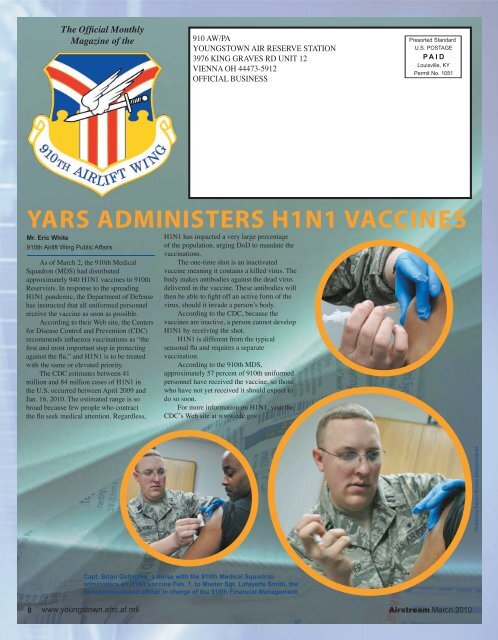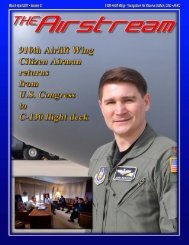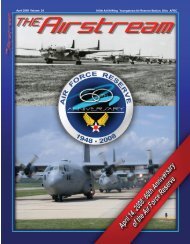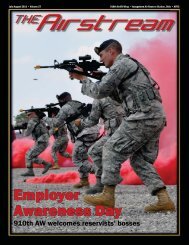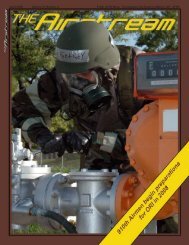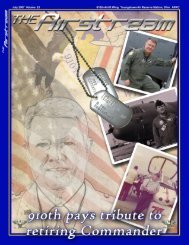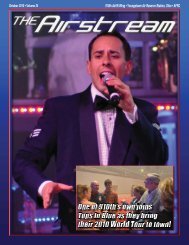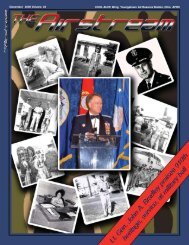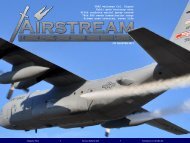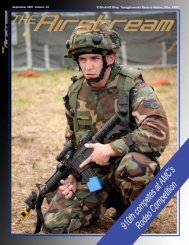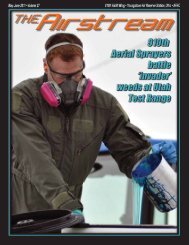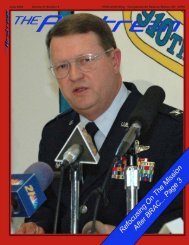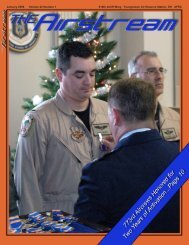page 1 March 2010 - cover.psd - Youngstown Air Reserve Station
page 1 March 2010 - cover.psd - Youngstown Air Reserve Station
page 1 March 2010 - cover.psd - Youngstown Air Reserve Station
You also want an ePaper? Increase the reach of your titles
YUMPU automatically turns print PDFs into web optimized ePapers that Google loves.
The Ofcial Monthly<br />
Magazine of the<br />
910 AW/PA<br />
YOUNGSTOWN AIR RESERVE STATION<br />
3976 KING GRAVES RD UNIT 12<br />
VIENNA OH 44473-5912<br />
OFFICIAL BUSINESS<br />
Presorted Standard<br />
U.S. POSTAGE<br />
PAID<br />
Louisville, KY<br />
Permit No. 1051<br />
YARS ADMINISTERS H1N1 VACCINES<br />
Mr. Eric White<br />
910th <strong>Air</strong>lift Wing Public Affairs<br />
As of <strong>March</strong> 2, the 910th Medical<br />
Squadron (MDS) had distributed<br />
approximately 940 H1N1 vaccines to 910th<br />
Reservists. In response to the spreading<br />
H1N1 pandemic, the Department of Defense<br />
has instructed that all uniformed personnel<br />
receive the vaccine as soon as possible.<br />
According to their Web site, the Centers<br />
for Disease Control and Prevention (CDC)<br />
recommends inuenza vaccinations as “the<br />
rst and most important step in protecting<br />
against the u,” and H1N1 is to be treated<br />
with the same or elevated priority.<br />
The CDC estimates between 41<br />
million and 84 million cases of H1N1 in<br />
the U.S. occurred between April 2009 and<br />
Jan. 16, <strong>2010</strong>. The estimated range is so<br />
broad because few people who contract<br />
the u seek medical attention. Regardless,<br />
H1N1 has impacted a very large percentage<br />
of the population, urging DoD to mandate the<br />
vaccinations.<br />
The one-time shot is an inactivated<br />
vaccine meaning it contains a killed virus. The<br />
body makes antibodies against the dead virus<br />
delivered in the vaccine. These antibodies will<br />
then be able to ght off an active form of the<br />
virus, should it invade a person’s body.<br />
According to the CDC, because the<br />
vaccines are inactive, a person cannot develop<br />
H1N1 by receiving the shot.<br />
H1N1 is different from the typical<br />
seasonal u and requires a separate<br />
vaccination.<br />
According to the 910th MDS,<br />
approximately 57 percent of 910th uniformed<br />
personnel have received the vaccine, so those<br />
who have not yet received it should expect to<br />
do so soon.<br />
For more information on H1N1, visit the<br />
CDC’s Web site at www.cdc.gov.<br />
Photos by Senior <strong>Air</strong>man Brenda Haines<br />
Capt. Brian Gallagher, a nurse with the 910th Medical Squadron<br />
administers an H1N1 vaccine Feb. 7, to Master Sgt. Lafayette Smith, the<br />
noncommissioned ofcer in charge of the 910th Financial Management.<br />
8 www.youngstown.afrc.af.mil<br />
<strong>Air</strong>stream <strong>March</strong> <strong>2010</strong>


